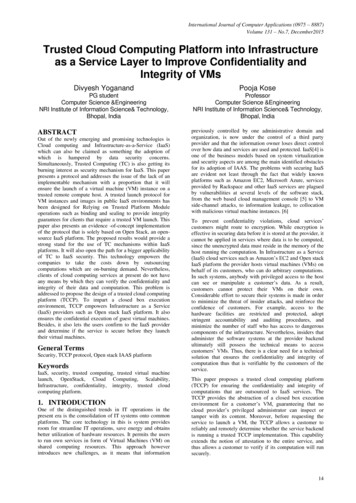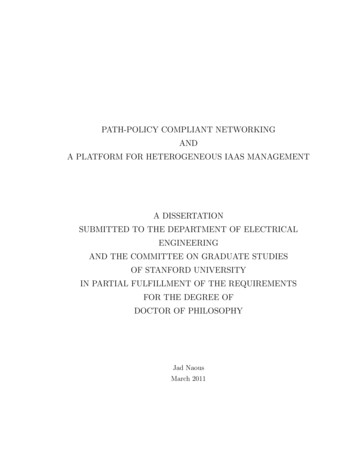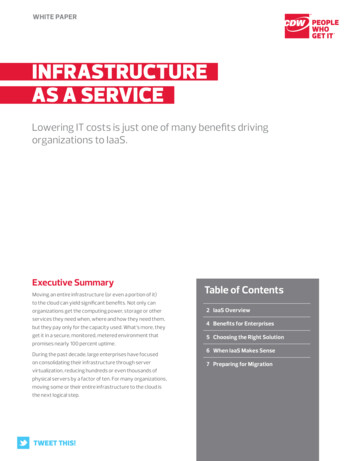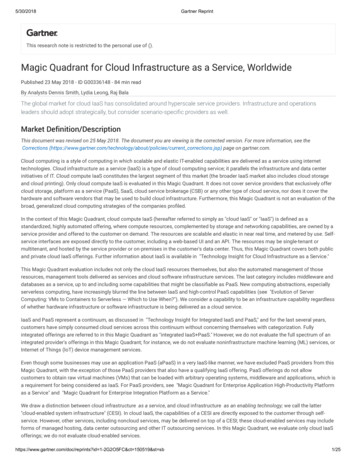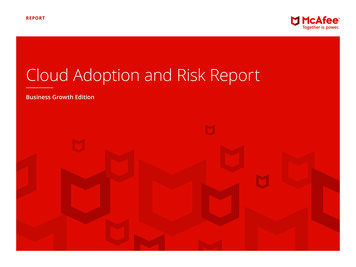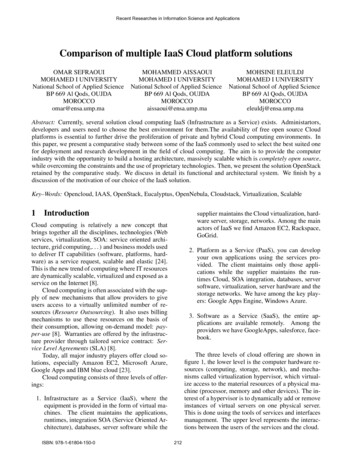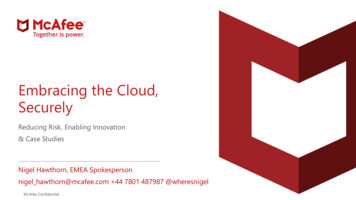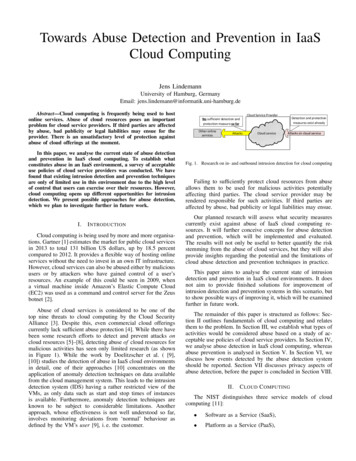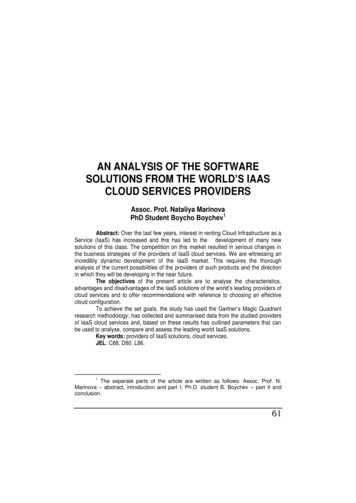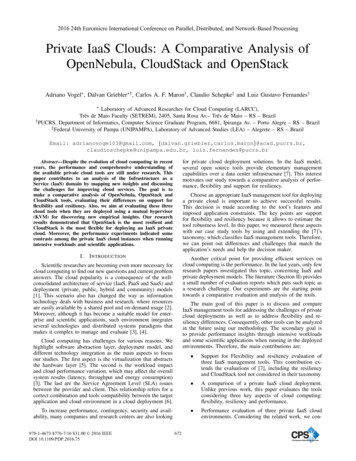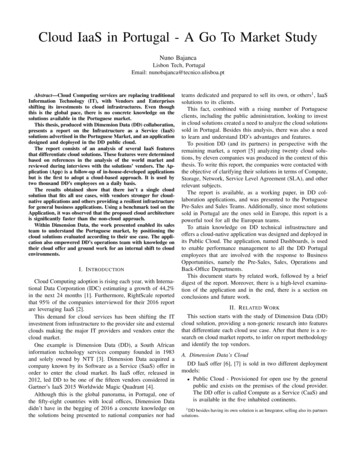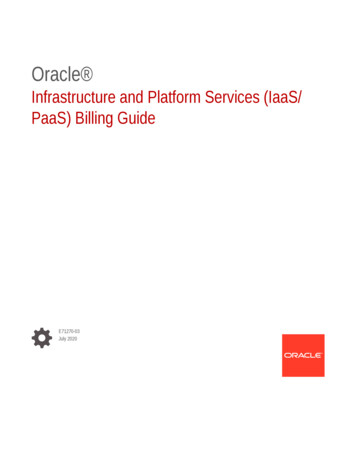
Transcription
Oracle Infrastructure and Platform Services (IaaS/PaaS) Billing GuideE71270-03July 2020
Oracle Infrastructure and Platform Services (IaaS/PaaS) Billing Guide,E71270-03Copyright 2016, 2020, Oracle and/or its affiliates.This software and related documentation are provided under a license agreement containing restrictions onuse and disclosure and are protected by intellectual property laws. Except as expressly permitted in yourlicense agreement or allowed by law, you may not use, copy, reproduce, translate, broadcast, modify, license,transmit, distribute, exhibit, perform, publish, or display any part, in any form, or by any means. Reverseengineering, disassembly, or decompilation of this software, unless required by law for interoperability, isprohibited.The information contained herein is subject to change without notice and is not warranted to be error-free. Ifyou find any errors, please report them to us in writing.If this is software or related documentation that is delivered to the U.S. Government or anyone licensing it onbehalf of the U.S. Government, then the following notice is applicable:U.S. GOVERNMENT END USERS: Oracle programs (including any operating system, integrated software,any programs embedded, installed or activated on delivered hardware, and modifications of such programs)and Oracle computer documentation or other Oracle data delivered to or accessed by U.S. Governmentend users are "commercial computer software" or "commercial computer software documentation" pursuantto the applicable Federal Acquisition Regulation and agency-specific supplemental regulations. As such,the use, reproduction, duplication, release, display, disclosure, modification, preparation of derivative works,and/or adaptation of i) Oracle programs (including any operating system, integrated software, any programsembedded, installed or activated on delivered hardware, and modifications of such programs), ii) Oraclecomputer documentation and/or iii) other Oracle data, is subject to the rights and limitations specified in thelicense contained in the applicable contract. The terms governing the U.S. Government’s use of Oracle cloudservices are defined by the applicable contract for such services. No other rights are granted to the U.S.Government.This software or hardware is developed for general use in a variety of information management applications.It is not developed or intended for use in any inherently dangerous applications, including applications thatmay create a risk of personal injury. If you use this software or hardware in dangerous applications, then youshall be responsible to take all appropriate fail-safe, backup, redundancy, and other measures to ensure itssafe use. Oracle Corporation and its affiliates disclaim any liability for any damages caused by use of thissoftware or hardware in dangerous applications.Oracle and Java are registered trademarks of Oracle and/or its affiliates. Other names may be trademarks oftheir respective owners.Intel and Intel Inside are trademarks or registered trademarks of Intel Corporation. All SPARC trademarks areused under license and are trademarks or registered trademarks of SPARC International, Inc. AMD, Epyc,and the AMD logo are trademarks or registered trademarks of Advanced Micro Devices. UNIX is a registeredtrademark of The Open Group.This software or hardware and documentation may provide access to or information about content, products,and services from third parties. Oracle Corporation and its affiliates are not responsible for and expresslydisclaim all warranties of any kind with respect to third-party content, products, and services unless otherwiseset forth in an applicable agreement between you and Oracle. Oracle Corporation and its affiliates will notbe responsible for any loss, costs, or damages incurred due to your access to or use of third-party content,products, or services, except as set forth in an applicable agreement between you and Oracle.
Contentsiii
AbstractThis document lists various billing models offered on Oracle Infrastructure andPlatform Services (IaaS/PaaS).4
Oracle Infrastructure and Platform Services(IaaS/PaaS) Billing Guide Billing Models Offered Understanding Your Invoice Key Billing Terminology Frequently Asked QuestionsBilling Models OfferedOracle offers the following types of billing or subscription models: Annual Universal Credits Monthly Universal Credit (subject to Oracle approval) Universal Credits, Pay As You Go Bring Your Own License (BYOL) Oracle Cloud at Customer Government SubscriptionsAnnual Universal Credits You commit to an annual pool of funds. You are billed in advance with a 12-month minimum and debited monthly based onyour actual usage. You must use the credits within the applicable 12-month credit period. Any unusedamount or credits within that period are forfeited. Customers can commit to an amount of Oracle Annual Universal Credits thatcan be applied towards the future usage of eligible Oracle IaaS and PaaS cloudservices. Enables you to have the flexibility to use any Oracle Cloud Infrastructure andplatform services at any time, in any region, to deliver faster time to market. Offers a significant savings across cloud services, combining cost reduction and apredictable monthly spend with a ramp up period as you onboard your workloads. Offers flexibility of starting and stopping services based on your requirements,similar to an on-demand/pay-as-you-go model. Any services used after the entire amount is consumed are charged based on yourcontractual service price. See Oracle Universal Credit Pricing. You'll receive an activation email from Oracle. This email contains the accountlogin information. The billing starts on the day you receive the activation email,unless your account has been contracted with delayed provisioning. See servicedescription.5
Billing Models OfferedMonthly Universal Credit (subject to Oracle approval) You commit to a monthly credit pool of funds. You are billed in advance for the committed amount based on the payment termsof your contract. The subscription term is for 12 months. The 12-month period begins on the daythat you receive your welcome or activation email, unless otherwise specified inyour order. You can use all eligible Oracle Infrastructure and Platform Cloud (Oracle IaaS/PaaS) services. Based on your monthly commitment and subscription duration, the service pricingmay be discounted. Credits from your monthly commitment are metered based on your usage andbilled per the service rate card. Any usage above the monthly commitment isincurred as overage and billed monthly in arrears, per the rate card. The monthly committed amount or credits must be used within the monthly commitperiod. Any unused amount or credits within that period are forfeited. Any services used after the entire amount is consumed are charged based oneither the list price or the rate card price, whichever is lower. See Oracle UniversalCredit Pricing.Universal Credits, Pay As You Go Pay for only what you use. You can use all the eligible Oracle IaaS/PaaS offerings. There are no up-front fees. All charges are based on metered usage and calculated as per Oracle’s list priceor rate card, whichever is lower. Usage billed monthly in arrears is based on the payment terms in the agreement.PAYG vs Annual Universal Credits Payment PlansYou opt for Pay As You Go (PAYG) when.You opt for Annual Universal Creditswhen.You’re still in the process of determining all the You know the services that you want to useOracle Cloud services that you would use.and have an estimate of the usage.You want the flexibility to pay per actual usage You want the benefit of lower pricing and areinstead of paying upfront.willing to make an upfront annual commitment.You pay for your usage per the terms of yournegotiated contract.Based on your requirements and expectedworkload or usage, you decide on the annualcommitment amount.Bring Your Own License (BYOL)Oracle offers BYOL as a billing option for some Oracle PaaS services, which enablesyou to leverage your existing Oracle software licenses on Oracle Cloud.You continue your existing Oracle license support and contract for the cloud servicesas well. With BYOL, you can move to Oracle Cloud at a lower cost. You areresponsible for paying the license support contract and Cloud service subscription.Licenses applied toward a BYOL version of a Cloud service are considered in use.6
Understanding Your InvoiceSee About Bring Your Own License Subscriptions in Oracle Cloud Infrastructuredocumentation.Oracle Cloud at CustomerA subscription to Oracle Cloud at Customer consists of both a hardware subscriptionand a software subscription. Both are required to run Oracle Cloud in your data center.The Cloud at Customer hardware subscription consists of: The hardware required to run the Oracle Cloud control plane, which is the basesoftware stack required to run Oracle Cloud The optional hardware required for additional compute nodes, object storage, orblock storage Optional hardware required if you are subscribing to Exadata Cloud at Customeror Big Data Cloud at CustomerTo learn more about the rates and conditions for Oracle Cloud at Customer hardwaresubscriptions, contact Oracle Sales.The Oracle Cloud at Customer software subscription is similar to Oracle Cloud.Starting with Oracle Cloud at Customer 18.1.4, all new Oracle Cloud at Customersubscriptions use Universal Credits.With Universal Credits, you can apply your credits toward the metered use of anyOracle PaaS service available on Oracle Cloud at Customer. However, unlike OracleCloud, not all PaaS services are provisioned immediately after you sign up for OracleCloud at Customer. If services are not available when you first sign in to Oracle Cloudat Customer, then you can work with your Oracle representative to have those PaaSservices provisioned.For more information about Oracle Cloud at Customer, see the Oracle Cloud atCustomer documentation on the Oracle Help Center.Government SubscriptionsOracle offers the Government purchase model, designed specifically for governmentcustomers. This purchase model allows government customers to buy resources foreach service separately and access only those services they’ve purchased. A monthlyamount (in USD or equivalent in local currency) is committed for each purchasedservice and the service usage is drawn down from that committed amount. Thecommitted amount can’t be transferred between services. Refer to the service-specificdetails at Oracle Government Tech Cloud Service Descriptions.For more information, contact your Oracle Sales representative.Understanding Your InvoiceYour invoice provides a summary of your service usage charges depending on thetype of payment model you’ve opted for: Pay As You Go or Annual Universal Credits.Additional taxes, or adjustments if any, will apply.An invoice is generated after your services are provisioned. You may receive multipleinvoices for a single order based on the provisioning times of the services in yourorder. Typically, your invoice is sent to you by mail to your bill-to address. You can alsoview your Cloud invoices in Oracle Store after they have been sent to you. You can7
Understanding Your Invoicedownload your invoices from My Services. Your invoice is generated based on yourcontractual agreement with us regarding the billing frequency and the payment terms. Billing Concepts and Payment Terms What Does Your Invoice Contain? Types of Invoices –Annual Universal Credits–Monthly Universal Credits–Pay As You Go–PrepaidOveragesBasic Billing Concepts Billing Frequency: Specifies when a bill for a purchase can be sent to you.–Annual in Advance: Total amount billed at the start of the billing term–Quarterly in Advance: Total amount billed in 4 installments at the start of eachquarter–Quarterly in Arrears: Total amount billed in 4 installments at the end of eachquarter. Typically, used for public sector customersPayment Terms: Specify the amount of time you are allowed to pay the balancedue on the invoice. Typically, within 30 days of the invoice date. Payment termsapply when Oracle extends credit you. For example, a credit is extended if youcommit to pay via a purchase order. When you pay by credit card, the paymentterm is immediate. Pay As You Go (PAYG) subscriptions must be paid by creditcard per Oracle policy.What Does Your Invoice Contain? Customer information such as name and address Product information, that is, services purchased Invoice number and date Payment terms and instructions, due date Purchase order and order numbers Additional information such as billing start/end dates, or contract informationFor more information on invoices and invoicing standards, see O2C InvoicingStandardsTypes of InvoicesAnnual Universal Credits InvoiceIf you have opted for Annual Universal Credits payment model, then the billingfrequency is determined by your contract. Typically, you’ll be billed annually in advancefor the amount you committed to. If you exceed the committed amount, then overagesare calculated and billed monthly in arrears separately as per the negotiated terms ofyour contract. Unused amount or credits don't expire at the end of the month.Your Annual Universal Credits invoice contains details of your subscription and thecharges for the month along with taxes.8
Understanding Your InvoiceMonthly Universal Credits InvoiceIf you have opted for Monthly Universal Credits payment model, then the billingfrequency is determined by your contract. Typically, you’ll be billed annual in advancefor the amount you committed to. The invoice period for Monthly Universal Credits isfrom the start of your contract upto 30 days. For example, if you’ve committed 1000per month, then you’ll be billed 1000 at the start of every month for that month’susage. If you exceed the committed amount, then overages are calculated and billedmonthly in arrears separately as per the negotiated terms of your contract. Unusedamount or credits are forfeited.Your Monthly Universal Credits invoice contains details of your subscription and thecharges for the month along with taxes.Pay As You Go (PAYG) InvoiceIf you opt for PAYG payment model, you don’t need to make an upfront commitmentbut can pay for services as you consume them. Invoice is generated in arrears basedon your actual usage for each month.You’ll be billed monthly for the usage you incurred the previous month. Your PAYGinvoice includes details of the product and is consolidated for the entire billing period.Prepaid InvoiceThese invoices are generated during the time of purchase of any metered services ofOracle Platform or Infrastructure Cloud services (Oracle IaaS/PaaS). Prepaid invoicesare generated annually for the purchased amount. If you exceed your committedamount, then you’ll be charged overages and billed separately.For example, if you buy an annual Oracle Storage Classic subscription for 10,000upfront, you are billed annually for that amount, but, the usage is tracked hourly. Anyunused amount will be forfeited. However, you can still continue to use your serviceseven after your subscription period ends, and your usage is billed monthly in arrearsper the Pay-As-You-Go model.OveragesUsage of metered services exceeding your purchased amount or credits results inoverages. Here, the usage is tracked per hour and billed monthly in arrears.Overages for the Annual Universal Credits plan are charged per your negotiated termsof contract. If you exceed the committed amount, then overages are calculated andbilled monthly in arrears separately as per the negotiated terms of your contract.Overages are billed separately.Overages for the Prepaid plan are charged at your negotiated price with us.Nonmetered or Government InvoicesIf you’re using nonmetered services, then you can exceed your subscription capacityby 2 times the purchased number of resources. This is referred to as Bursting andyou’re billed per your usage. Usage invoices are generated separately and are sentmonthly in arrears. Government users are billed according to the service categoriesthey purchase. They don’t incur overages, however, if they use commercial servicecategories such as Universal Credits, then they may be charged for bursting oroverage.9
Key Billing TerminologyViewing and Downloading Your InvoiceTypically, invoices are mailed to you to your Bill To address.However, you can view your account usage and download your invoice from OracleCloud Infrastructure Console. See Cost Analysis Overview.Key Billing Terminology100 Entities per Hour: 100 entities where each entity refers to a technical asset beingmanaged or monitored, such as a server, database, application that resides either inthe cloud and/or on-premise, during a one hour period. Examples of entities includeHost, Docker Container, SQL Server instance, MySQL instance, Oracle Databaseinstance, WebLogic Server, Tomcat, Oracle Traffic Director Instance, or customcreated entity. You can extend existing predefined entities and create your own customentities.1,000 or 10,000 Requests per Month: Either a maximum of 1,000 or 10,000 requestsper month, of the type of REST API requests used, including PUT, HEAD, POST,COPY, LIST, DELETE, and GET.Active User per Hour: A unique active user who interacts with an Oracle Cloudservice through a specific channel (website, mobile app, API, SMS) during a one-hourperiod. Active users are tracked through the use of audit logs, cookies, user ids,tokens, device ids, IPs or session ids. If the user accesses multiple channels, then it’scounted as multiple active users on an hourly basis. An active user is tracked for eachinstance of the Oracle Cloud service.Gateway per Hour: Single state representation of one or more instances (calledgateway nodes) of the gateway application component installation. A gateway isrepresented as a “Gateway” in the Management Service database and is shown assuch in the user interface. A gateway is counted by counting the number of gatewaysin the “Gateways” tab in the Management Service user interface during a single hour.When a gateway node is registered to the Management Service, you have the optionto register it to an existing gateway or to create a new gateway. When the last nodeis deregistered, you have the option to delete the gateway and reduce the count ofgateways.Gigabyte Storage Capacity per Month: The quantity of computer storage space ingigabytes (1073741824 bytes) used during a month.Gigabyte Outbound Data Transfer per Month: The quantity of data downloadedfrom any Oracle cloud service and any transfer of data from any Oracle cloud serviceover the Internet, including responses to your client requests during a month.Gigabyte Memory per Hour: The number of gigabyte memory hours allocated as partof Oracle Application Container Cloud Service instance.Gigabyte of Data Processed per Hour: The quantity of data transfer from/to theLoad Balancer over the internet including responses to your client requests during acalendar monthGigabyte Data Capacity per Hour: The volume of data generated, ingested,managed, and analyzed from the monitored accounts and applications. Capacity mayinclude development, test, quality assurance (QA), training, preproduction, production,10
Key Billing Terminologyhigh availability (HA), disaster recovery (DR) or any other environments that arenecessary to be monitored by Oracle’s Cloud Service offerings.Hosted Named User per Month: An individual authorized to access the hostedservice in a calendar month, regardless of whether the individual is actively accessingthe hosted service at any given time.Hosted Environment per Hour: Database instance provided as part of the OracleCloud Database Service (the Hosted Environment), the use of which is measuredon a per hour basis. The Oracle Cloud Database Service instance has a base CPUcapacity, locally attached storage, and includes a number of database OCPU licenses,based on the shape selected by you (that is, one of the four editions of OracleDatabase – Standard, Enterprise, Enterprise High Performance or Enterprise ExtremePerformance). Each partial Hosted Environment Hour consumed will be billed as a fullhour. Please note that: Each Hosted Environment has 2 OCPUs enabled. You may scale up to 36 OCPUsin increments of 2. For 2-node RAC: Each Hosted Environment has 4 OCPUs enabled. You mayscale up to 72 OCPUs in increments of 4.Interactions per Month: A request initiated from the client browser delivering upto 100K of data in a calendar month. If a request exceeds 100K, then it counts asmultiple interactions.Monitored Account per Hour: Your Oracle Infrastructure and Platform CloudServices (Oracle IaaS/PaaS) account that includes (1) Your email address andpassword, (2) Control of resources available or created within the account, and (3)Payment for the Oracle IaaS/PaaS activity related to those resources. Active indicatesthat the account is configured and activated in Oracle Cloud Access Security Broker(CASB) Service.Monitored Service User per Hour: An individual user of Oracle Software as aService (Oracle SaaS) applications, who’s monitored each hour for each service alongwith the Oracle Cloud Access Security Broker (Oracle CASB) service. Users mayinclude employees, customers, partners, consultants, contractors, and agents.OCPU per Month (Calendar Month) or per Hour: The number of Oracle ComputeUnit (OCPU) hours used as part of Oracle Compute Cloud Service. An OCPU providesthe CPU capacity equivalent to one physical core of an Intel Xeon processor withhyperthreading enabled. Each OCPU corresponds to two hardware execution threads,known as vCPUs. Each OCPU has a predefined amount of memory. Oracle ComputeCloud Service supports two kinds of shapes for virtual machines: General Purposeand High Memory. High Memory shapes have more memory associated with an OCPUthan the General Purpose shapes.Partition Hour: The number of partition hours used as part of an Oracle Cloudservice. A partition provides the capacity equivalent of 1 MB/s of data ingress, 2 MB/sof data egress and 1000 PUT operations per second.Storage Pack per Month: One hundred (100) gigabytes of file storage across allusers per customer in a calendar month.Terabyte Storage Capacity per Month: Terabytes (1024 bytes) of computer storagespace used by a storage filer of an Oracle Cloud Service during a month.Overage : Excess usage of purchased services are considered as overage. It’stracked per hour and billed monthly in arrears. For example, you commit to 28,00011
Frequently Asked Questionsas your subscription amount but you use 30,000 worth of services. So, 2000 isconsidered as overage and billed monthly in arrears.Customer Rate Card: The rate you negotiate with us for the services you use.Frequently Asked Questions1.What are the available purchase models?The available purchase models are:2. Pay As You Go: Pay As You Go (PAYG) pricing lets customers quicklyprovision services with no commitment, and they’re only charged for whatthey use. There’s no upfront commitment and no minimum service period.Any cloud infrastructure (IaaS) and platform (PaaS) services consumed aremetered and billed based on that consumption. If, during the services periodof your order, Oracle makes new IaaS and PaaS services available within yourcloud services account, Oracle will notify you of any fees that would apply totheir activation and use. For more details, see our complete price list. Annual Universal Credits: Oracle Annual Universal Credits enablescustomers to have the flexibility to use any Oracle Cloud Infrastructure andplatform services at any time, in any region, to deliver faster time to market.Customers can commit to an amount of Oracle Annual Universal Credits thatcan be applied towards the future usage of eligible Oracle IaaS and PaaScloud services. This payment option offers a significant savings across cloudservices, combining cost reduction and a predictable monthly spend with aramp up period as you on-board your workloads.What are the pricing or discounting models?PAYG and Annual Universal Credits prices are available on Oracle UniversalCredit Pricing. Automatic discounts apply based on a published discount schedule.3.What Cloud Services can I use with my Universal Credits?Any Oracle Infrastructure or Platform Cloud Services (IaaS and PaaS) that areavailable on the rate card. The exception to this is Enterprise Analytics Services inNorth America, which has a separate Universal Credits SKU.4.What happens when Oracle releases new services to existing Universal Creditsagreements?New services are added to the list of existing services in Universal Creditsagreements (to the existing rate card) without additional charges. However, theirusage is charged per the applicable price card.5.Can Universal Credits be used in Oracle Cloud Infrastructure (OCI) and OCIClassic?Yes.6.What is the minimum term for a Universal Credits agreement?The minimum term is 12 months. Longer terms are available.7.How are Universal Credits consumed?You consume your Universal Credits by creating service instances. The rate ofconsumption (burn down) is specified in the rate card on an hourly basis. OracleUniversal Credits must be used during the service period and will expire at the end12
Frequently Asked Questionsof that yearly credit period; any prepaid unused amounts are nonrefundable andare forfeited at that time.8.Is a delayed start possible?Yes, you can specify a future date to start your subscription.9.What’s the start date for Universal Credits usage or burn down?The start date for metering of Universal Credits is the date when you receive theaccount information. This is known as the activation email.10. Can I use my existing bursting capability for Universal Credits?With Universal Credits, you don’t require bursting as Universal Credits offer youa greater flexibility. If you exceed your resource capacity, then you’ll be chargedoverages for your usage as per Oracle’s price list.11. How is overage calculated?If you exceed your monthly commitment amount, then overage is billed as per thenegotiated terms of your contract.12. How can I control my spending or monitor my usage in Universal Credits?See Managing Budgets.13. Is there any way to prevent overage?To some extent, you can control overage by setting alerts with soft limits. You willbe notified as to the overage and you can then delete or scale down your serviceinstances.13
Previous Billing ModelsPreviously, Oracle Cloud offered the following types of subscriptions for OracleInfrastructure and Platform Cloud Services (Oracle IaaS/PaaS): Universal Credits, Monthly Flex: Uses a payment model wherein you are billed inadvance for the committed amount based on the payment terms of your contract. Nonmetered Subscriptions: Uses a subscription payment model, wherein a setnumber of resources is bought. Metered Services: Uses prepaid payment model, wherein a specified amount iscommitted for purchase.The above subscriptions and their payment methods are still used in somecircumstances: For accounts created before the availability of Universal Credits For some specific Oracle Cloud offerings For Oracle Infrastructure Cloud Services (IaaS) on Cloud at CustomerUniversal Credits, Monthly Flex You commit to a monthly credit pool of funds. You are billed in advance for the committed amount based on the payment termsof your contract. The subscription term is minimum 1 year. The 12-month period begins on the daythat you receive your welcome or activation email, unless otherwise specified inthe agreement. Your monthly commitment must be at least 1000 USD or equivalent in localcurrency and you can use all the eligible Oracle Infrastructure and Platform Cloud(Oracle IaaS/PaaS) services. Based on your monthly commitment and subscription duration, the service pricingmay be discounted. Credits from your monthly commitment are metered based on your usage andbilled per the service rate card. Any usage above the monthly commitment isincurred as overage and billed monthly in arrears, per the rate card. The monthly committed amount or credits must be used within the monthly commitperiod. Any unused amount or credits within that period are forfeited. Any services used after the entire amount is consumed are charged based oneither the list price or the rate card price, whichever is lower. See Oracle UniversalCredit Pricing.Nonmetered Subscriptions The subscription term is 1 to 3 years, based on your selection during serviceordering through Oracle Store or an Oracle Sales representative. You agree to purchase a specific unit of a service, for example, 500 hosted namedusers.14
You're charged for service regardless of whether any services are consumed, forexample, even if only 1 hosted named user is set up, you're charged for 500hosted named users if that's the original agreement. You can manage your user quota and have overages in service usage. Quotamanagement allows you to set a specific overage ceiling amount. When thisamount is reached, your services are stopped. During service ordering, by default,overages are allowed. Services will be continued after the prepaid amount hasbeen consumed, but you're charged at the list price. You can exceed your subscription capacity by 2 times the purchased number ofresources if your service allows it. This is referred to as Bursting. You’ll be billedper your usage.Metered Services, Prepaid You make an upfront commitment for the amount you’ll spend for the services. Forexample, you commit to 10,000 for Storage service for 12 months. The subscription period is minimum 1 year. Your usage is tracked and any unused services or resources are forfeited. Usage after your subscription period ends is charged in arrears per the Pay AsYou Go model.15
Oracle offers BYOL as a billing option for some Oracle PaaS services, which enables you to leverage your existing Oracle software licenses on Oracle Cloud. You continue your existing Oracle license support and contract for the cloud services as well. With BYOL, you can move to Oracle Cloud at a lower cost. You are
